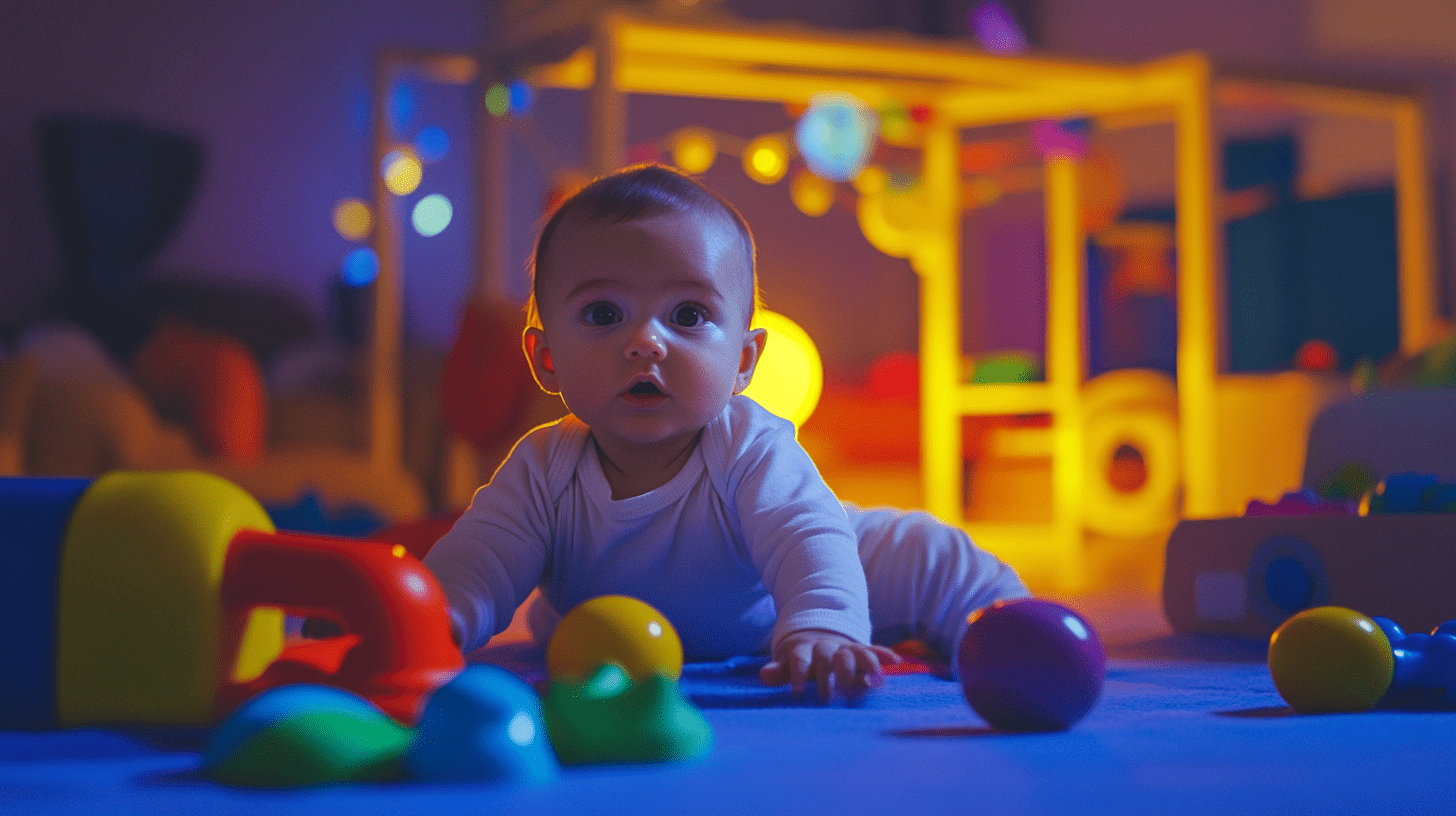The Benefits of Solo Play
While spending time together is essential, don’t underestimate the power of solo play. It’s a treasure trove of learning opportunities! Here’s why:
- Cognitive Development: Kids explore at their own pace, promoting critical thinking and learning from mistakes.
- Self-Reliance: They become comfortable being on their own, strengthening their identity.
- Boosted Self-Esteem: Confidence flourishes when kids overcome challenges independently.
- Creative Expression: Allows them to flex their imagination, exploring interests in unique ways.
Remember, when kids play alone, they’re also laying the groundwork for social skills. As they learn to appreciate their own company, they become more open to connecting with others!
Independent Play Time By Age
Let’s break down solo play into manageable segments based on age:
- 6 months: 5 minutes of playtime
- 12 months: 15 minutes
- 18 months: 15 to 20 minutes
- 2 years: 30 minutes
As your baby grows, so too does their capacity for solo play! Remember, their temperament also plays a significant role—every child is unique, and understanding them is key.
Getting Started with Solo Play
To ease your child into independent play, establish a daily “alone time” routine. Here’s a friendly plan:
- Create a safe, childproof area with favourite toys.
- Start by engaging in play together, then gently step back.
- For younger babies, maintain a reassuring presence nearby, giving encouragement from a distance.
Your little one might initially resist this shift. If they stop playing as soon as you leave, try a simple game of playing and walking away briefly. Repeat this a few times to help them understand that you’ll always return. It’s this predictability that fosters their growing independence.
Conquering Clinginess When Playing Alone
As your child begins to recognise their individuality, it’s common for separation anxiety to creep in. Never fear! This phase is just a sign that they are developing a sense of self. Encourage them to explore independently by letting them take the lead in their adventures. When they venture off on their own, give them a moment before you follow. This small pause teaches them that they are safe, even when you’re not in sight.
Stop Feeling Guilty About Independent Play
Sometimes, the biggest roadblock to independent play is the parents’ own guilt. So let’s set the record straight: It’s perfectly okay to let your child play solo! Quality time is essential, but so is the ability for your child to learn to enjoy their own company. As hard as it may be, remind yourself that independent play is a valuable learning experience for your child.
So, embark on this exploration of solo play with enthusiasm, knowing that each moment spent apart is a step toward your child’s confidence and growth!
Getting Started With Independent Play
Independent play is essential for your child’s growth and development. While parents cherish every moment spent with their little ones, allowing them space to explore independently is equally important. This guide aims to support parents in encouraging independent exploration through age-appropriate tips. Learn how to support your child’s solo play to nurture their development and give yourself a much-needed break!
The Benefits of Solo Play
While beneficial interaction with adults and peers is vital to a child’s development, expert opinions emphasise the importance of solo play for babies and toddlers. Through independent play, kids engage in various learning experiences that foster crucial skills such as:
- Problem Solving: Children learn to tackle challenges independently, building cognitive skills.
- Autonomy: Solo play helps kids explore their identity and feel more self-reliant.
- Creative Thinking: Engaging with toys and their surroundings encourages imaginative exploration.
- Self-Esteem: Gaining mastery over tasks boosts a child’s confidence and self-worth.
As a child reaches around 8 months, they begin to perceive themselves as distinct individuals, making independent play vital for strengthening their identity. According to Claire Lerner, a child development specialist at Zero to Three, building comfort with being alone allows children to relate with others based on friendship rather than avoidance of solitude.
4 Ways to Teach Your Toddler to Play Without You
Encouraging a toddler to engage in independent play comes with benefits for everyone involved. Parents can enjoy short breaks while their children immerse themselves in enjoyable and enriching activities. Here are four strategies to foster solo play:
- Establish Routine: Make a habit of having designated “alone time” every day, so children become accustomed to the practice.
- Designate a Safe Space: Use a childproof area stocked with familiar toys or books to provide a secure environment for solo play.
- Start Small: Initially, stay within a short distance during their playtime, offering verbal encouragement as needed to provide a sense of security.
- Gradually Increase Distance: As your child grows comfortable, you can take longer breaks and move further away, while ensuring you still monitor their activities.
Independent Play Time By Age
To effectively encourage independent play, keep in mind your child’s age and developmental stage. Each milestone allows for increased engagement in solo play:
- 6 Months: A child may enjoy independent play for approximately 5 minutes.
- 12 Months: Solo play ability typically increases to around 15 minutes.
- 18 Months: Children might engage in independent play for 15 to 20 minutes.
- 2 Years: Independent play may last about 30 minutes.
Remember, a child’s temperament plays a role in how well they adapt to solo play. Children with calmer dispositions might become independent at a younger age compared to those who are more demanding.
Conquering Clinginess When Playing Alone
As children develop a sense of identity apart from their parents, feelings of separation anxiety can often surface. Because young children lack an understanding of time, they may become upset when their parents are out of sight for even short periods. Here are a couple of strategies to manage clinginess:
- Let Them Initiate Alone Time: If your child moves into another room, give them a minute or two before checking in.
- Reassure Without Rushing Back: If they start to fuss, acknowledge them verbally rather than immediately returning to their side.
With patience, they will gradually learn that being alone can be a positive experience.
Stop Feeling Guilty About Independent Play
Sometimes, it’s not the child who resists solitary play—it’s the parents. Many parents feel guilty if they’re not engaging their child in stimulating activities every moment of the day. While quality time is important, it’s just as crucial to understand that allowing children to play alone is a positive, necessary learning experience. Remind yourself that what you are doing is not neglect but nurturing independence and creativity in your child.
Conclusion
Independent play is an essential part of your child’s growth and development. It fosters problem-solving skills, autonomy, and creativity while working wonders for their self-esteem. Implementing a routine of solo play can benefit both children and parents, providing opportunities for valuable exploration and a much-needed respite for caregivers. Remember, you are not only promoting healthy development but also empowering your child to embrace their individuality.

| Key Points | Details |
|---|---|
| Importance of Independent Play | Solo play is vital for child development, enhancing skills such as problem solving, creativity, and autonomy. |
| Benefits of Solo Play | Encourages self-reliance, allows exploration at their pace, helps focus attention, and boosts self-esteem. |
| Age-Based Guidance for Independent Play | Independent play varies by age, with babies starting at 5 minutes and toddlers progressing to 30 minutes or more. |
| Encouraging Solo Play | Establish daily “alone time” with childproofed areas and favorite toys; gradually increase distance as comfort grows. |
| Managing Clinginess | Allow children to initiate their alone time; provide reassurance without rushing back to instill confidence in their independence. |
| Parental Guilt about Single Play | Parents may feel guilty for not being engaged constantly; understanding the importance of independent play can help alleviate this. |
| Independent Play Details for Age Groups |
|



